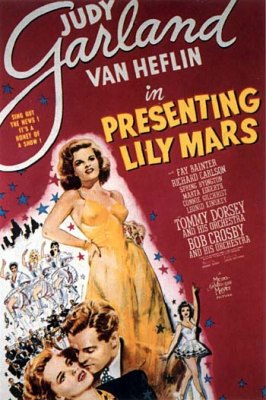| Reviews & Columns |
|
Reviews DVD TV on DVD Blu-ray 4K UHD International DVDs In Theaters Reviews by Studio Video Games Features Collector Series DVDs Easter Egg Database Interviews DVD Talk Radio Feature Articles Columns Anime Talk DVD Savant Horror DVDs The M.O.D. Squad Art House HD Talk Silent DVD
|
DVD Talk Forum |
|
|
| Resources |
|
DVD Price Search Customer Service #'s RCE Info Links |
|
Columns
|
|
|
Presenting Lily Mars
Garland's title character lives in a small, Indiana town with her widowed mother (Spring Byington) and four younger siblings, including Davey (Douglas Croft, who that same year played Robin in the first film adaptation of Batman, a 15-chapter serial), who inexplicably collects doorknobs. Nineteen-year-old Lily dreams of being an actress and enlists the aide of neighbor Mrs. Thornway (Fay Bainter) whose son, John (Van Heflin), is a big Broadway producer readying his latest extravaganza, Let Me Dream.
John, however, is sick of his mother's habit of dropping talentless hopefuls at his doorstep, and greatly annoyed at Lily's efforts to impress him with her unsolicited and quite bad reading as Lady Macbeth. Undeterred, she hitch-hikes all the way to New York, sneaking into Thornway's theater, determined to see her big dreams realized.
Presenting Lily Mars operates from the conceit that non-stop pestering, rather than talent, is the fastest road to show-biz success. If nothing else the film makes an interesting contrast to Garland's later A Star is Born (1954), in which her very able vocalist, despite obvious talent, struggles in a cynical, cruel Hollywood and where she's not very optimistic about her chances there. In Lily Mars, Garland's irrepressible character is believably single-minded but Thornway's put-upon producer is not; he'd probably have Lily arrested and get a restraining order against her.
Surprisingly, the obvious route for Richard Connell and Gladys Lehman's screenplay to have taken - that of making Lily a lousy actress but great singer ultimately discovered by Thornway - is so awkwardly adapted that opera singer Martha Eggerth, sixth-billed, has more songs to sing than Judy. Further, the film's insanely lavish musical finale plays tacked on, as if to placate angry Judy Garland fans suckered into what was at least suggested in the original advertising as a musical. That number, extensively reworked after negative previews, is too much too late, featuring one set that looks like a colossal waffle iron: as Tommy Dorsey and His Orchestra swing atop it, Judy sings and dances under their feet, ready to be flattened at any moment.
Besides Garland's infrequent songs, the film's only other saving grace is its performances, well-directed by the otherwise routine Norman Taurog. In the midst of her glamour phase at MGM, Garland is lovely to look at and pretty funny acting badly. Van Heflin is well cast, with just the right balance of gravitas and appealing vulnerability. Richard Carlson has a couple of good scenes as the show's playwright, who in atypically double-entendre-filled scripting for MGM, believes Lily has illegitimately fathered three children by Thornway. Connie Gilchrist has a sweet number with Judy as a cleaning woman with a like-minded passion for the stage.
Video & Audio
Presenting Lily Mars is presented in its original full frame format in a sparkling black and white transfer. The image is sharp, near pristine, with strong blacks and good contrast. Warner Home Video seems to be cutting corners in the subtitle and closed captioning department. Instead of the usual optional subtitles in English, French and Spanish, only English subtitles are included, and the disc is not closed-captioned.
Extra Features
The disc's excellent supplements include two short subjects, also from 1943: Heavenly Music, a bizarre if Oscar-winning two-reeler about a bandleader's judgment day in Heaven, where he has to defend American popular music to a Who's Who committee of classical composers; and Who Killed Who?, a surreal cartoon directed by Tex Avery that spoofs the then-current fad for movie mysteries.
An alternate version of the finale, the one that tested badly with preview audiences, is included, as is an (inadvertently) stereo audio recording of the final cut's showstopper, though the audio separation is modest, much less so than on Fox's Glenn Miller's titles, to cite one example. There's also a trailer, an audio-only outtake song, "Paging Mr. Greenbacks," and a radio adaptation with Van Heflin and June Allyson.
Parting Thoughts
Judy Garland fans will enjoy her energetic performance while being disappointed at the dearth of musical numbers, at least ones performed by her. Presenting Lily Mars isn't bad, just bland and somewhat misguided.
Film historian Stuart Galbraith IV's most recent essays appear in Criterion's new three-disc Seven Samurai DVD and BCI Eclipse's The Quiet Duel.
|
| Popular Reviews |
| Sponsored Links |
|
|
| Sponsored Links |
|
|
| Release List | Reviews | Shop | Newsletter | Forum | DVD Giveaways | Blu-Ray | Advertise |
|
Copyright 2024 DVDTalk.com All Rights Reserved. Legal Info, Privacy Policy, Terms of Use,
Manage Preferences,
Your Privacy Choices | |||||||















